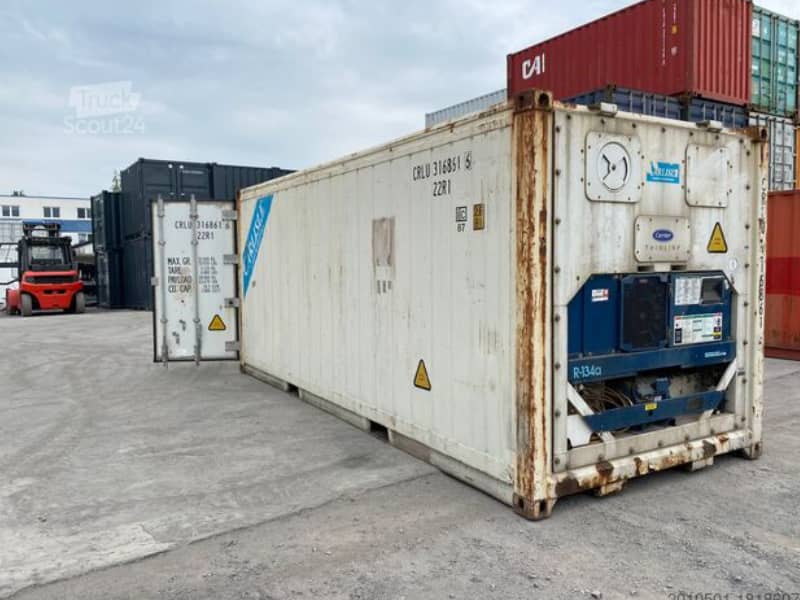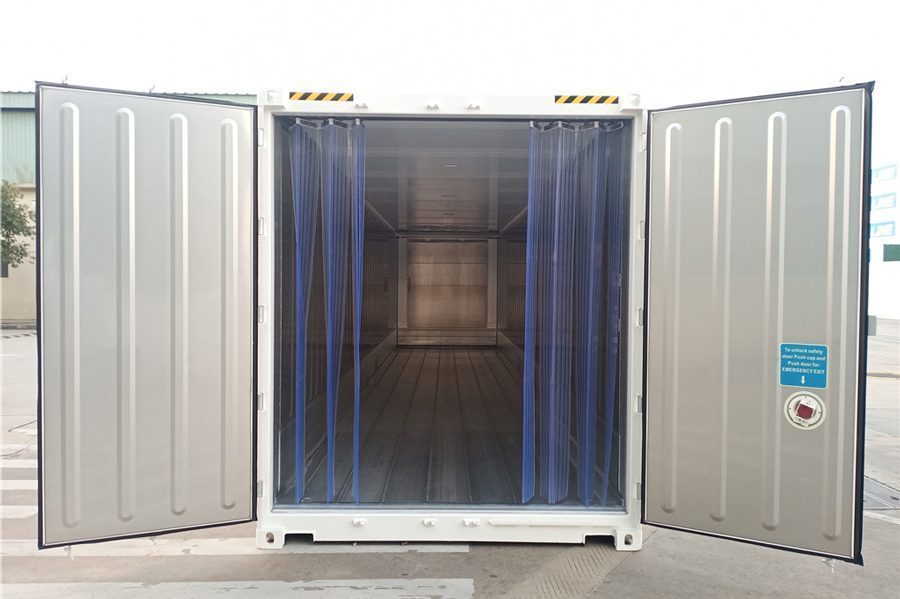Everything About Freezer Containers: Essential Insights for Your Storage Space Needs
Cold storage space containers play a crucial role in the conservation of disposable goods. They are available in various kinds, including chilled and protected units, each made for specific storage needs. Understanding the advantages and essential features of these containers is essential for services aiming to enhance their operations. As the demand for reliable storage options grows, checking out the various options offered can lead to notified choices that impact both earnings and sustainability. What variables should one think about when picking the ideal container?
Kinds Of Cold Store Containers
Cold storage containers been available in numerous kinds, each designed to meet particular temperature control requirements. Amongst one of the most usual types are refrigerated containers, which maintain temperature levels between 0 ° C to 10 ° C, making them appropriate for perishable items like fruits, veggies, and milk items. An additional kind is the deep fridge freezer container, which operates at temperatures below -18 ° C, ideal for long-term storage of icy things such as meats and fish and shellfish.
Shielded containers give temperature level security without energetic cooling, making them helpful for short-term transport of temperature-sensitive items. In addition, there are mobile freezer systems, which provide versatility in places and are commonly made use of in occasions or seasonal procedures. Blast refrigerators quickly decrease the temperature level of warm foods, guaranteeing safety and top quality. Each kind serves an unique objective in different industries, from food solution to pharmaceuticals, emphasizing the relevance of picking the ideal container for particular storage space demands.

Benefits of Using Cold Store Solutions

Furthermore, cold storage space services extend the service life of products, reducing waste and boosting earnings for companies. By successfully handling stock with appropriate temperature control, companies can maximize their supply chains and improve operational effectiveness.
Furthermore, cold store facilities enable adaptable storage options, suiting numerous volume requirements and seasonal variations in demand (used 40ft refrigerated shipping containers). This adaptability assists businesses react swiftly to market modifications
Using cold storage space remedies can guarantee compliance with health and security regulations, protecting both customers and companies. Generally, the tactical usage of cold store boosts item management while advertising sustainability and economic practicality.
Key Functions to Look for in Freezer Containers
When choosing cold store containers, a number of essential functions advantage mindful factor to consider to protect peak efficiency and reliability. Temperature control abilities are essential; containers should preserve constant temperatures ideal for certain products. Insulation quality additionally plays a considerable duty, as premium insulation decreases energy consumption and improves temperature stability.
Next, convenience of gain access to and loading is vital; containers need to offer easy to use layouts for reliable handling and company. Resilience is one more vital facet; weather-resistant products assure longevity and guard materials against environmental variables.
In addition, flexibility features, such as built-in wheels or lifting factors, facilitate transportation, while personalized designs permit customized storage services.
Finally, monitoring systems, consisting of temperature level alarm systems and remote tracking, offer real-time updates, ensuring that conditions stay excellent. By focusing on these features, customers can choose cold storage space containers that meet their functional demands successfully.
Selecting the Right Cold Store Container for Your Demands
Selecting the ideal cold store container calls for a thoughtful assessment of certain requirements and functional needs. Elements such as the kind of products being stored, temperature level level of sensitivity, and volume should be prioritized. Disposable food products may require containers with stringent temperature level controls, while pharmaceuticals may need exact problems to preserve efficiency.
In addition, possible customers should think about the container's dimension and wheelchair. A bigger unit may be necessary for bulk storage space, while smaller sized, portable choices could be suitable for short-term or on-site demands. Insulation high quality and energy efficiency are additionally vital, as these will certainly influence operational prices and temperature stability.
Finally, conformity with industry laws and criteria is important, especially in sectors like food and medical care. By meticulously assessing these aspects, customers can select a freezer container that properly satisfies their one-of-a-kind needs and assurances optimum storage problems.
Ideal Practices for Maintaining Cold Store Issues
Maintaining excellent cold store conditions is vital for protecting the quality and security of temperature-sensitive products. Regularly monitoring temperature level and humidity degrees is important; using reliable digital thermostats and hygrometers can give exact readings. Moreover, proper insulation of freezer containers assists decrease temperature variations and energy loss.
Carrying out a first-in, first-out (FIFO) system ensures that older inventory is made use of before more recent supply, lowering waste (used 40ft refrigerated shipping containers). In addition, maintaining an arranged design within the storage room permits much better air flow and lessens the threat of cross-contamination
Routine maintenance examine tools, such as seals and compressors, are necessary to stop breakdowns. Staff training on ideal techniques for packing and unloading items assists keep temperature stability. Maintaining doors shut as much as feasible restrictions heat exchange, assuring that the cool storage environment stays stable and effective in protecting valuable products.
Price Factors To Consider for Cold Store Solutions
When examining cold store remedies, it is important to take into consideration the preliminary financial investment costs together with ongoing operational costs. A comprehensive malfunction of these expenses can reveal significant lasting financial savings potential for services. Comprehending these monetary elements assists stakeholders make notified choices regarding their cool storage needs.

Initial Financial Investment Prices
The monetary landscape of cold storage containers provides numerous first financial investment costs that services need to consider. These costs commonly consist of the purchase or rental price of the containers, which can vary based on size, insulation, and type high quality. In addition, expenditures connected to retrofitting existing frameworks to suit cold store must be factored in, especially if specialized tools is required. Installment expenses, consisting of electric job and refrigeration systems, additionally add to the total initial financial investment. Companies ought to not neglect transport costs for supplying containers to their preferred location. Potential customization options, such as shelving or temperature level tracking systems, can further influence the first economic outlay. Careful budgeting for these elements is crucial for successful cool storage space application.
Operational Costs Failure
Functional costs for freezer services incorporate a number of critical price considerations that businesses should browse. Secret elements include power prices, which can be significant as a result of the need to maintain low temperatures. Maintenance expenses are likewise significant, as routine servicing is vital to guarantee equipment operates efficiently and continues to be certified with health and safety and security criteria. Furthermore, labor costs might arise from the requirement for specialized personnel to take care of and check the storage environment. Insurance coverage costs are an additional factor to consider, as business need to shield their investments versus possible losses. Any kind here of potential regulatory compliance prices need to be factored in, as organizations might need to spend in systems that adhere to food safety and environmental regulations. Recognizing these costs is essential for effective budgeting.
Long-Term Savings Possible
Buying cool storage solutions offers substantial long-lasting cost savings potential, transforming first expenditures right into economic efficiency with time. By reducing perishing and waste, companies can enhance their earnings margins substantially. Advanced insulation and energy-efficient systems reduce energy costs, which build up over the life-span of the devices. Additionally, cool storage containers frequently call for much less regular maintenance contrasted to standard refrigeration approaches, resulting in lower fixing expenditures. The capability to shop products for extended durations without jeopardizing quality permits companies to profit from market changes, optimizing profits. Additionally, the scalability of freezer services enables business to adjust to changing demands without incurring excessive costs. In general, these factors add to a compelling instance for freezer as an affordable financial investment approach.
Often Asked Questions
The Length Of Time Can Food Be Stored in Freezer Containers?
The period food can be kept in cool storage containers varies by type. Generally, disposable items last from days to weeks, while frozen foods can continue to be risk-free for months, depending upon appropriate temperature level and storage space conditions.
Are Cold Store Containers Energy-Efficient?
The energy efficiency of cold store containers differs based on style and insulation top quality. Modern devices often make use of advanced innovation to minimize energy intake, eventually adding to reduced operational prices and environmental influence in long-term usage.
Can Cold Storage Containers Be Customized for Particular Requirements?
Cold store containers can certainly be customized to satisfy details demands. Adjustments might include temperature level controls, dimension changes, and additional features, permitting users to customize services effectively for various storage space demands and functional choices.
What Are the Usual Sizes of Cold Store Containers?
Cold store containers typically come in conventional dimensions such as 10, 20, and 40 feet. These dimensions accommodate different storage requirements, ensuring adaptability for organizations requiring temperature-controlled settings for delicate products or disposable goods.
Do Cold Store Containers Require Special Permits for Usage?
Freezer containers often need special permits for usage, relying on regional guidelines and meant applications. Authorities might mandate authorizations to ensure security criteria, environmental compliance, and proper functional techniques are preserved during their use.
Cold storage containers come in numerous types, each created to fulfill details temperature control demands. Additionally, chilly storage centers permit for flexible storage choices, fitting various volume requirements and seasonal changes in demand. Selecting the ideal cool storage space container needs a thoughtful evaluation of specific demands and functional demands. The economic landscape of cold storage space containers presents different initial financial investment costs that services have to think about. Cold storage space containers can indeed be tailored to meet particular requirements.